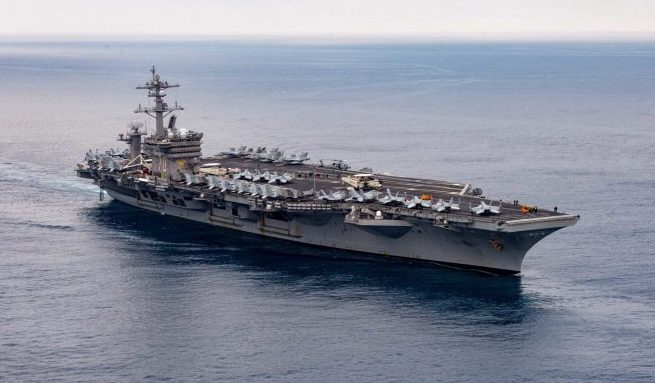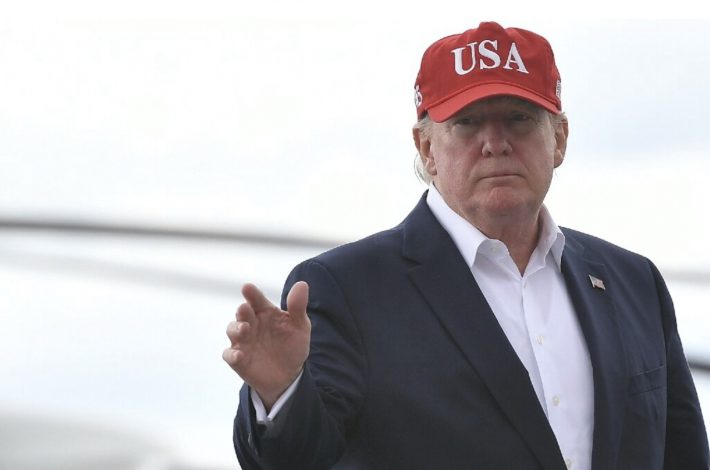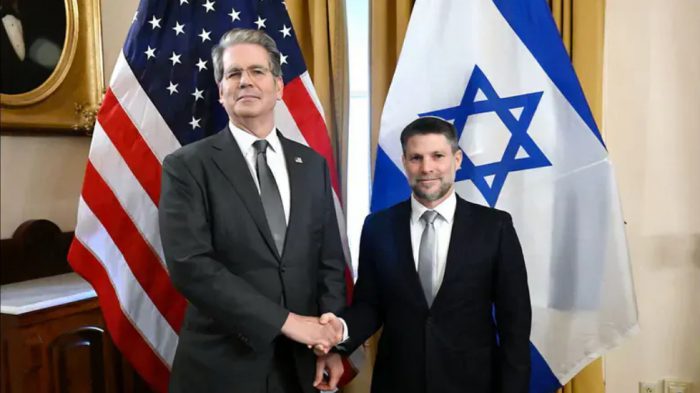President Trump’s bold decision to redeploy America’s most advanced aircraft carrier from the Mediterranean to South America signals a global power shift—just as Israel’s fragile ceasefire with Hamas begins to unravel.
In a dramatic global military maneuver, U.S. President Donald Trump has ordered the USS Gerald R. Ford, America’s most advanced and powerful aircraft carrier, to leave the Mediterranean and redeploy to South America—a stunning move that underscores Washington’s pivot toward a hemispheric war on drug cartels even as tensions simmer in the Middle East.
The redeployment comes at a critical moment: a tenuous ceasefire between Israel and Hamas—brokered by Trump himself—has been shaken by renewed rocket fire and retaliatory Israeli airstrikes in Gaza. With the Ford’s departure, the U.S. will be left in the rare position of having no aircraft carrier stationed near Europe or the Middle East for the first time in years, despite ongoing instability from Iran to the Red Sea.
The Ford’s withdrawal is particularly striking given that, over the past two years, five U.S. carrier groups have operated near Israel’s coastline and the Persian Gulf in one of the most intense deployment cycles since the Second World War. The Ford’s redeployment marks a strategic realignment, reflecting the Trump administration’s increasing emphasis on South American security and counter-narcotics operations, especially near Venezuela, whose regime faces U.S. narcoterrorism charges.
“Because of our success at sea,” Trump declared aboard the USS George Washington in Japan, “now we’ll stop the drugs coming in by land.”
The Ford’s movement south, coupled with 13 recent U.S. naval strikes on cartel vessels, signals what many analysts see as the start of a hemispheric security doctrine—a Trump-led campaign to project military might not just across oceans, but across continents.
However, defense analysts warn that the absence of a carrier presence near Israel could complicate future deterrence. “It’s such a powerful and scarce resource,” said retired Marine Colonel Mark Cancian of the Center for Strategic and International Studies. “If peace talks collapse or Iran stirs trouble again, the pressure to send the Ford back to the region will be immense.”
Currently, only three of America’s 11 nuclear carriers are operational at sea:
- USS Gerald R. Ford, en route to South America
- USS Nimitz, returning home from the South China Sea before decommissioning after two aircraft losses
- USS Theodore Roosevelt, running exercises off San Diego
The move comes amid a renewed wave of violence in Gaza, just two weeks into the Trump-brokered truce. The IDF launched precision strikes on Hamas targets after detecting new rocket launches, warning that “Israel will not allow the ceasefire to become a shield for terror.”
Meanwhile, in South America, the Ford’s redeployment adds immense pressure on Venezuelan dictator Nicolás Maduro, whom Trump and Secretary of State Marco Rubio accuse of state-backed drug trafficking. While Rubio insists the buildup is strictly a counter-narcotics mission, regional observers see a potential prelude to regime change.
“Maduro’s government has turned Venezuela into a cocaine superhighway,” Rubio said. “The United States will act wherever the lawless threaten our citizens.”
For Israel and its allies, Trump’s strategy reflects a broader truth: American deterrence remains global—whether in Darfur, Gaza, or the Caribbean. But as one Israeli defense official privately warned, “Every time the carrier leaves the Mediterranean, Iran smiles.”In a dramatic global military maneuver, U.S. President Donald Trump has ordered the USS Gerald R. Ford, America’s most advanced and powerful aircraft carrier, to leave the Mediterranean and redeploy to South America—a stunning move that underscores Washington’s pivot toward a hemispheric war on drug cartels even as tensions simmer in the Middle East.
The redeployment comes at a critical moment: a tenuous ceasefire between Israel and Hamas—brokered by Trump himself—has been shaken by renewed rocket fire and retaliatory Israeli airstrikes in Gaza. With the Ford’s departure, the U.S. will be left in the rare position of having no aircraft carrier stationed near Europe or the Middle East for the first time in years, despite ongoing instability from Iran to the Red Sea.
The Ford’s withdrawal is particularly striking given that, over the past two years, five U.S. carrier groups have operated near Israel’s coastline and the Persian Gulf in one of the most intense deployment cycles since the Second World War. The Ford’s redeployment marks a strategic realignment, reflecting the Trump administration’s increasing emphasis on South American security and counter-narcotics operations, especially near Venezuela, whose regime faces U.S. narcoterrorism charges.
“Because of our success at sea,” Trump declared aboard the USS George Washington in Japan, “now we’ll stop the drugs coming in by land.”
The Ford’s movement south, coupled with 13 recent U.S. naval strikes on cartel vessels, signals what many analysts see as the start of a hemispheric security doctrine—a Trump-led campaign to project military might not just across oceans, but across continents.
However, defense analysts warn that the absence of a carrier presence near Israel could complicate future deterrence. “It’s such a powerful and scarce resource,” said retired Marine Colonel Mark Cancian of the Center for Strategic and International Studies. “If peace talks collapse or Iran stirs trouble again, the pressure to send the Ford back to the region will be immense.”
Currently, only three of America’s 11 nuclear carriers are operational at sea:
- USS Gerald R. Ford, en route to South America
- USS Nimitz, returning home from the South China Sea before decommissioning after two aircraft losses
- USS Theodore Roosevelt, running exercises off San Diego
The move comes amid a renewed wave of violence in Gaza, just two weeks into the Trump-brokered truce. The IDF launched precision strikes on Hamas targets after detecting new rocket launches, warning that “Israel will not allow the ceasefire to become a shield for terror.”
Meanwhile, in South America, the Ford’s redeployment adds immense pressure on Venezuelan dictator Nicolás Maduro, whom Trump and Secretary of State Marco Rubio accuse of state-backed drug trafficking. While Rubio insists the buildup is strictly a counter-narcotics mission, regional observers see a potential prelude to regime change.
“Maduro’s government has turned Venezuela into a cocaine superhighway,” Rubio said. “The United States will act wherever the lawless threaten our citizens.”
For Israel and its allies, Trump’s strategy reflects a broader truth: American deterrence remains global—whether in Darfur, Gaza, or the Caribbean. But as one Israeli defense official privately warned, “Every time the carrier leaves the Mediterranean, Iran smiles.”





